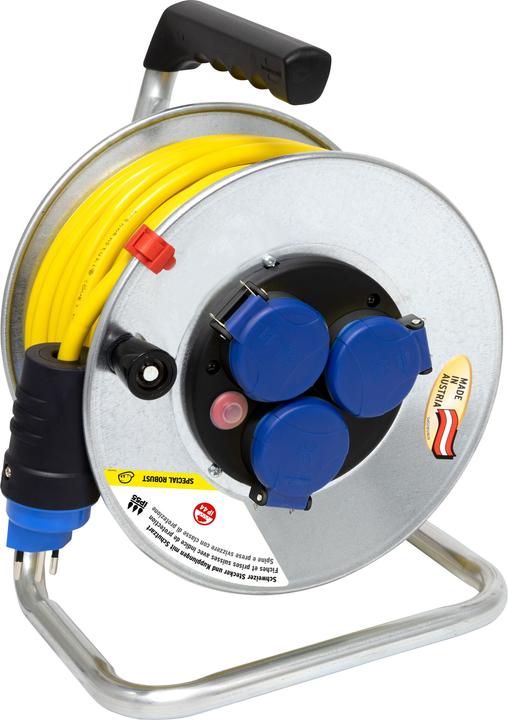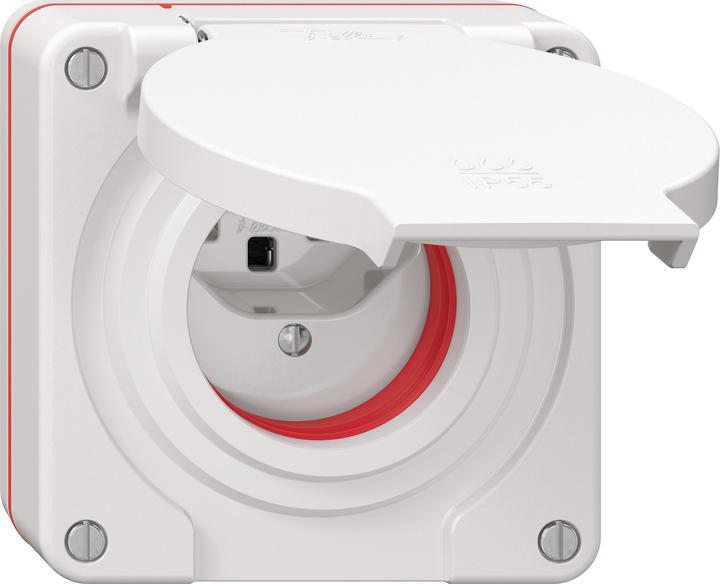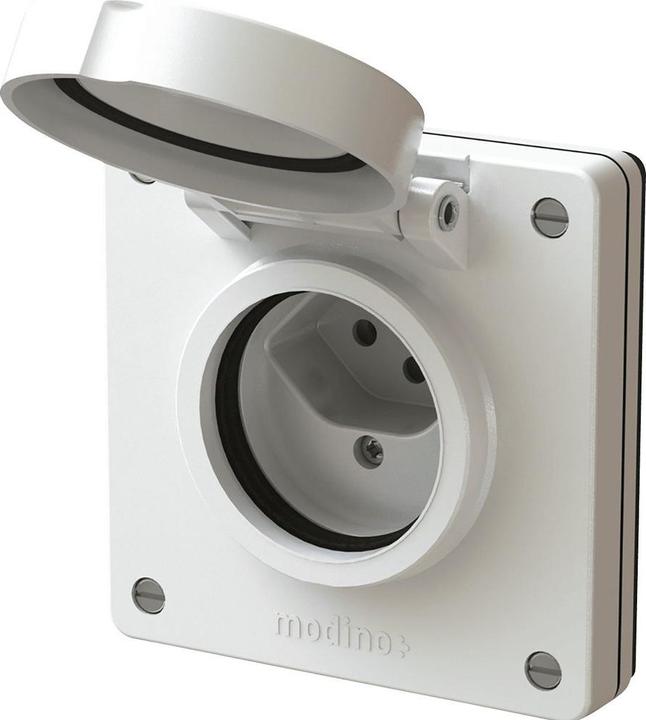

New Swiss law: why you need to check the plug before buying a new outdoor device
A new, stricter standard was put in force in Switzerland this year. Devices for outdoor use, such as robot lawnmowers, high-pressure washers and pond pumps now need to have an IP55-compliant plug.
SN 441011 is a magical combination of letters and numbers to make your life safer. Because of a Swiss standard (SN), which has been in force since 1 January 2025, you can now only buy devices equipped with an IP55-compliant plug.
SN 441011 applies to devices that aren’t hand-held and used unattended over a longer period of time. These include, socket distributors and cable drums, for example. The standard also applies to devices that require a higher degree of protection due to their nature and use; think high-pressure cleaners and concrete mixers, for example. (If you want to go down the rabbit hole, the complete eight-page document with all the details specifications is available as a PDF in German here.)
What’s important to know is that you’re responsible for ensuring that the new device you purchase complies with the standard. Since the beginning of this year, Swiss retailers are no longer allowed to sell old, non-standard appliances. At Galaxus, hard-working people have been working away in the background and sorting out the range. In theory, this should be done by vendors everywhere, but there’s no way of knowing if some of them will be selling non-compliant leftover stock. This could be a marketplace retailer on this platform or a brick-and-mortar store out there in the real world.
Let’s say you buy yourself a new pond pump abroad. Seeing that you’re the importer of the device, you’re also responsible for ensuring it has the correct Swiss IP55 plug. This was pointed out to me by Severo Nicoli from the Swiss Federal Inspectorate for Heavy Current Installations (ESTI), whom I spoke to about SN 441011. He says it would be «sensible and desirable» for products by non-Swiss stores to comply with the legislation of their target country. Presumably, however, German dealers, for example, will primarily be concerned with complying with German plug regulations. But they happen to be different to those in Switzerland. This is because plugs and sockets are still regulated by national laws, even if Europe is becoming closer in some aspects.
In case you’re thinking about working around the SN 441011 with adapters, don’t. Why not? Because it’s not permitted to fit an IP44-plug appliance with an adapter to save costs. This is also clearly regulated in the brochure. What would be OK, however, is for a specialist with the necessary qualifications to convert the device and fit it with an IP55 plug.
Old devices may still be used
When I first heard about the SN 441011, I was worried I’d have to replace my five-year-old robot lawnmower, as its charging station still has as IP44 plug. This means it’s protected against splash water, but not against «strong water jets». IP55 also provides better protection against dirt and dust. (My coworker Martin Jud has listed and explained all types of protection in this article. )
So even though my robot lawnmower’s a somewhat unsafe veteran, I can keep on using it. This is because old appliances are protected by what is known as the grandfather clause, meaning older devices are exempt from the new rule, as Severo Nicoli explains.
This also applies to outdoor sockets. According to SN 441011, newly installed sockets must feature protection class IP55. For laypeople, it’s quite easy to recognise by the rubber ring.
So you can keep existing sockets and continue to use them. However, they’re often only IP44-protected and are frequently hidden behind a hinged lid. If the lid’s closed, not much water can get in. However, if you’ve plugged a device into it, the lid stays open, thereby significantly reducing the protective effect. So for safety reasons, we’re also seeing stricter regulations here.
Cutting corners with security
It’ll probably take years or even decades before the new rules of SN 441011 (the number’s starting to look familiar, right?) are implemented everywhere. Due to the grandfather clause, most homeowners will probably not need to hire an electrician to carry out the conversion. Especially as even a defective IP44 socket doesn’t have to be replaced with the IP55 version if, for example, only the hinged lid is broken. All you’d need to do in this case is to restore the level of protection required, or lid in this case.
Then there are cost-conscious consumers who might buy a device abroad that doesn’t meet the standard. Although an information leaflet issued by the Federal Inspectorate for Heavy Current Installations states that compliance with the standard is checked on a random basis. I asked Severo Nicoli about this, who said it was unclear how and when these spot checks were carried out. There aren’t any numbers on non-compliance cases either. «We don’t keep any statistics.» It seems, the focus is more on consumers taking responsibility.
Note and addition (26 March 2025): My above article on the consequences of the new SN 441011 standard has received a surprising number of comments and queries. This may be partly because of the header image I chose. It shows an outdoor socket of the old kind, before the new standard came into force. Contrary to my initial statement, the photo below, which I added later, was unfortunately not an IP55 installation in accordance with the new standard either. This was pointed out to me by reader Renzo Argirò, who runs a specialist electrical store in Ebmatingen, Switzerland, and therefore knows a thing or two about the subject from his daily work. In his opinion, the confusion is also down to the fact that outdoor sockets certified as IP44 until the end of 2024 have effectively been downgraded to IP21 as a result of the new standard. However, the labelling obviously won’t be retroactively changed on sockets that have already been produced and sold.

What’s important to know is that sockets that meet the new standard, i.e. are IP55-certified, have a red or black rubber insert. This protects them against jets of water while the device is plugged in. What’s also changed is that the popular triple sockets for outdoor are no longer being installed.
So what does this mean if you own a house or apartment with outside sockets? The expert Renzo Argirò’s advice is to replace sockets that are often or constantly used. Lawnmower robots are a typical example of this. A new model with an IP55 plug together with a new IP55-standard socket are a great combination, as the contacts oxidise less and a tripping RCD is prevented. Other sockets will need to be converted as more and more devices feature the new bulky IP55 plug and simply won’t fit old sockets anymore.
Journalist since 1997. Stopovers in Franconia (or the Franken region), Lake Constance, Obwalden, Nidwalden and Zurich. Father since 2014. Expert in editorial organisation and motivation. Focus on sustainability, home office tools, beautiful things for the home, creative toys and sports equipment.







